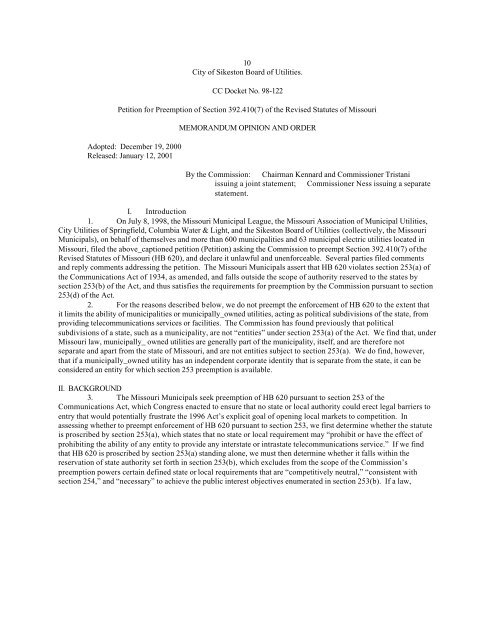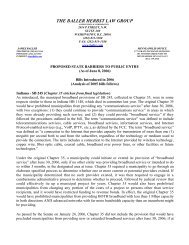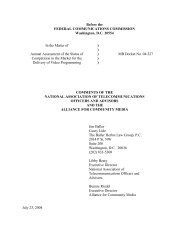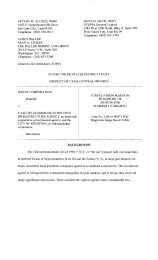Petition for Writ of Certiorari
Petition for Writ of Certiorari
Petition for Writ of Certiorari
Create successful ePaper yourself
Turn your PDF publications into a flip-book with our unique Google optimized e-Paper software.
10<br />
City <strong>of</strong> Sikeston Board <strong>of</strong> Utilities.<br />
CC Docket No. 98-122<br />
<strong>Petition</strong> <strong>for</strong> Preemption <strong>of</strong> Section 392.410(7) <strong>of</strong> the Revised Statutes <strong>of</strong> Missouri<br />
Adopted: December 19, 2000<br />
Released: January 12, 2001<br />
MEMORANDUM OPINION AND ORDER<br />
By the Commission: Chairman Kennard and Commissioner Tristani<br />
issuing a joint statement; Commissioner Ness issuing a separate<br />
statement.<br />
I. Introduction<br />
1. On July 8, 1998, the Missouri Municipal League, the Missouri Association <strong>of</strong> Municipal Utilities,<br />
City Utilities <strong>of</strong> Springfield, Columbia Water & Light, and the Sikeston Board <strong>of</strong> Utilities (collectively, the Missouri<br />
Municipals), on behalf <strong>of</strong> themselves and more than 600 municipalities and 63 municipal electric utilities located in<br />
Missouri, filed the above_captioned petition (<strong>Petition</strong>) asking the Commission to preempt Section 392.410(7) <strong>of</strong> the<br />
Revised Statutes <strong>of</strong> Missouri (HB 620), and declare it unlawful and unen<strong>for</strong>ceable. Several parties filed comments<br />
and reply comments addressing the petition. The Missouri Municipals assert that HB 620 violates section 253(a) <strong>of</strong><br />
the Communications Act <strong>of</strong> 1934, as amended, and falls outside the scope <strong>of</strong> authority reserved to the states by<br />
section 253(b) <strong>of</strong> the Act, and thus satisfies the requirements <strong>for</strong> preemption by the Commission pursuant to section<br />
253(d) <strong>of</strong> the Act.<br />
2. For the reasons described below, we do not preempt the en<strong>for</strong>cement <strong>of</strong> HB 620 to the extent that<br />
it limits the ability <strong>of</strong> municipalities or municipally_owned utilities, acting as political subdivisions <strong>of</strong> the state, from<br />
providing telecommunications services or facilities. The Commission has found previously that political<br />
subdivisions <strong>of</strong> a state, such as a municipality, are not “entities” under section 253(a) <strong>of</strong> the Act. We find that, under<br />
Missouri law, municipally_ owned utilities are generally part <strong>of</strong> the municipality, itself, and are there<strong>for</strong>e not<br />
separate and apart from the state <strong>of</strong> Missouri, and are not entities subject to section 253(a). We do find, however,<br />
that if a municipally_owned utility has an independent corporate identity that is separate from the state, it can be<br />
considered an entity <strong>for</strong> which section 253 preemption is available.<br />
II. BACKGROUND<br />
3. The Missouri Municipals seek preemption <strong>of</strong> HB 620 pursuant to section 253 <strong>of</strong> the<br />
Communications Act, which Congress enacted to ensure that no state or local authority could erect legal barriers to<br />
entry that would potentially frustrate the 1996 Act’s explicit goal <strong>of</strong> opening local markets to competition. In<br />
assessing whether to preempt en<strong>for</strong>cement <strong>of</strong> HB 620 pursuant to section 253, we first determine whether the statute<br />
is proscribed by section 253(a), which states that no state or local requirement may “prohibit or have the effect <strong>of</strong><br />
prohibiting the ability <strong>of</strong> any entity to provide any interstate or intrastate telecommunications service.” If we find<br />
that HB 620 is proscribed by section 253(a) standing alone, we must then determine whether it falls within the<br />
reservation <strong>of</strong> state authority set <strong>for</strong>th in section 253(b), which excludes from the scope <strong>of</strong> the Commission’s<br />
preemption powers certain defined state or local requirements that are “competitively neutral,” “consistent with<br />
section 254,” and “necessary” to achieve the public interest objectives enumerated in section 253(b). If a law,






